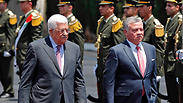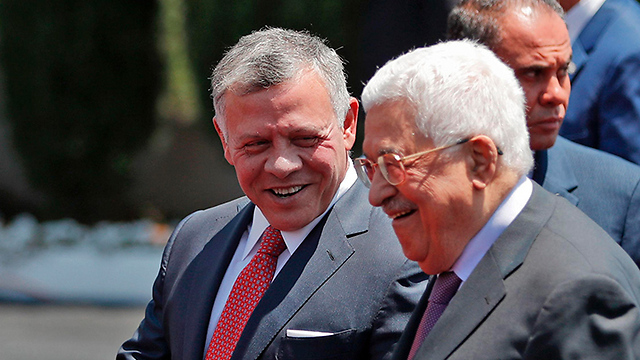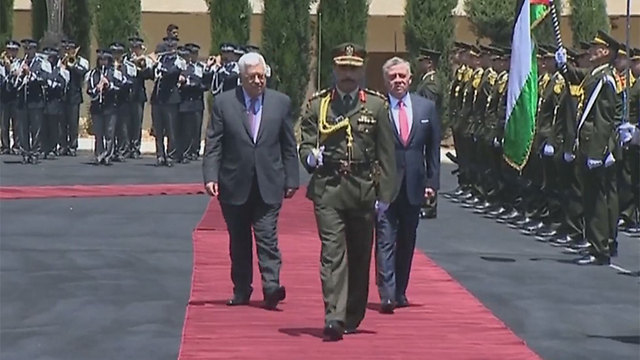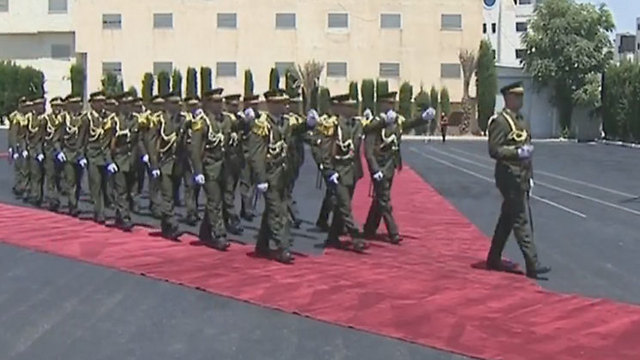
King Abdullah meets with PA President Abbas in Ramallah
Jordan's King Abdullah II meets with Palestinian Authority President Mahmoud Abbas in Ramallah for the first time in five years; the two leaders discuss Temple Mount tensions and wider political developments, including US peace initiatives.
While the two leaders meet fairly frequently in Amman and other regional capitals, Abdullah has not visited Ramallah, the seat of the Palestinian Authority, since December 2012.
The king arrived by helicopter, with the visit coordinated with Israeli authorities which control all entrance and exit points to the West Bank, including its 150 km border with Jordan and the air space above.
The visit comes two weeks since a surge in violence in Jerusalem after Israel installed metal detectors at Muslim entrances to the Al Aqsa mosque compound, following the killing of two Israeli policemen during a terror attack.
The change in security led to days of protests and clashes between Palestinian worshippers and Israeli security forces before Israel, after consultations with Jordan, decided to remove the metal detectors and other measures.
Jordan has been the custodian of Jerusalem's Muslim holy sites since the 1920s. The compound, which sits on a tree-lined plateau in the Old City, is also revered by Jews, who call it Temple Mount, the site of two ancient Jewish temples.
Palestinian officials provided little detail on what Abbas and Abdullah discussed, but said the situation at Al Aqsa and broader political concerns were touched on.
"The visit comes in the course of continued consultation and coordination on all levels," said Nabil Abu Rudainah, Abbas's spokesman.
"They will also evaluate the current incidents happening in Jerusalem and in particular what happened at Al Aqsa mosque and the efforts exerted to resolve the crisis."
According to the Jordanian Petra News, during the talks, both leaders stressed the need to preserve the historical and legal status quo on the Temple Mount. Changes to the arrangement, both men noted, will have negative consequences for the region as a whole.
King Abdullah reiterated that Jordan, in keeping with the Hashemite guardianship of Islamic and Christian holy sites in Jerusalem, continues to protect the holy sites in the city, through working with the international community and in all forums.
Jordan, which signed a peace treaty with Israel in 1994 and has growing, if little discussed, economic ties with its neighbor, often plays a mediating role in the region.
With a large percentage of Jordan's population made up of Palestinians, and Jordan sharing a border with the West Bank, which the Palestinians want for their own state together with east Jerusalem and Gaza, its position is sensitive.
Abbas and Abdullah also discussed US-led efforts to restart Israeli-Palestinian peace talks, which have been suspended for the past three years.
During the talks, Abdullah stressed the importance of working with the US administration to advance the peace process and re-launch serious and effective negotiations between Palestinians and Israelis based on the two-state solution.
President Donald Trump's regional envoy, Jason Greenblatt, has made several trips to Amman, Ramallah and Jerusalem this year to try to find common ground, but there is little sign of enthusiasm on anyone's part to start negotiating again.
Abdullah emphasized Jordan's full support for the rights of the Palestinian people and stressed his support for the establishment of an independent Palestinian state with east Jerusalem as its capital.
Abdullah is also playing a role in liaising with Egypt and others to see if long-standing differences between Abbas's Western-backed Fatah party and the rival Hamas Islamist movement can be resolved.
Hamas, which won the last parliamentary elections held in the Palestinian territories in 2005, seized full control of Gaza after a violent struggle with Fatah in 2007.
Over the past several months, Abbas, as head of the Palestinian Authority, has stepped up pressure on Hamas, cutting off salaries for civil servants in Gaza, limiting payments for electricity imports and some medicines.
The aim appears to be to oust Hamas from power, but there is little sign of that happening and efforts are being made by regional powers to resolve the internal fighting.














